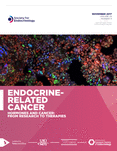Is there an effect of ghrelin/ghrelin analogs on cancer? A systematic review
- 1Division of Endocrinology, Diabetes, and Metabolism, Baylor College of Medicine, Alkek Building for Biomedical Research, Houston, Texas, USA
- 2Section of Gastroenterology and Hepatology, Baylor College of Medicine Medical Center, Houston, Texas, USA
- 3Clinical Epidemiology and Comparative Effectiveness Program, Section of Health Services Research (IQuESt), Michael E. DeBakey Veterans Affairs Medical Center, HSR&D Center of Innovation (152), Houston, Texas, USA
- 4Texas Medical Center Digestive Disease Center, Baylor College of Medicine, Houston, Texas, USA
- 5Dan L. Duncan Comprehensive Cancer Center, Baylor College of Medicine, Houston, Texas, USA
- 6Center for Translational Research on Inflammatory Diseases (CTRID), Michael E. DeBakey Veterans Affairs Medical Center, Houston, Texas, USA
- 7Department of Molecular and Cellular Biology, Baylor College of Medicine, Houston, Texas, USA
- 8Huffington Center on Aging, Baylor College of Medicine, Houston, Texas, USA
- 9Geriatrics Research Education and Clinical Center, Veterans Affairs Puget Sound Health Care System and University of Washington, Seattle, Washington, USA
- Correspondence should be addressed to J M Garcia; Email: jose.garcia{at}va.gov
Abstract
Ghrelin is a hormone with multiple physiologic functions, including promotion of growth hormone release, stimulation of appetite and regulation of energy homeostasis. Treatment with ghrelin/ghrelin-receptor agonists is a prospective therapy for disease-related cachexia and malnutrition. In vitro studies have shown high expression of ghrelin in cancer tissue, although its role including its impact in cancer risk and progression has not been established. We performed a systematic literature review to identify peer-reviewed human or animal in vivo original research studies of ghrelin, ghrelin-receptor agonists, or ghrelin genetic variants and the risk, presence, or growth of cancer using structured searches in PubMed database as well as secondary searches of article reference lists, additional reviews and meta-analyses. Overall, 45 (73.8%) of the 61 studies reviewed, including all 11 involving exogenous ghrelin/ghrelin-receptor agonist treatment, reported either a null (no statistically significant difference) or inverse association of ghrelin/ghrelin-receptor agonists or ghrelin genetic variants with cancer risk, presence or growth; 10 (16.7%) studies reported positive associations; and 6 (10.0%) reported both negative or null and positive associations. Differences in serum ghrelin levels in cancer cases vs controls (typically lower) were reported for some but not all cancers. The majority of in vivo studies showed a null or inverse association of ghrelin with risk and progression of most cancers, suggesting that ghrelin/ghrelin-receptor agonist treatment may have a favorable safety profile to use for cancer cachexia. Additional large-scale prospective clinical trials as well as basic bioscientific research are warranted to further evaluate the safety and benefits of ghrelin treatment in patients with cancer.
- Received 11 July 2016
- Accepted 14 July 2016
- Made available online as an Accepted Preprint 1 September 2016
- © 2016 Society for Endocrinology
 This work is licensed under a Creative Commons Attribution 3.0 Unported License.
This work is licensed under a Creative Commons Attribution 3.0 Unported License.












